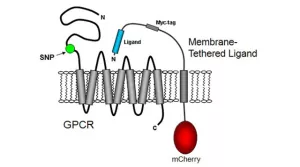The Kopin laboratory has studied the molecular pharmacology of G protein-coupled receptors (GPCRs) for two decades. Special interests include: structure-function relationships, GPCR-mediated physiology, polymorphism/mutation-induced alterations in function and the development of tools for drug discovery. Ongoing studies in the laboratory have clinical relevance in the areas of metabolic disease (i.e. obesity and diabetes), neurologic/locomotor dysfunction (e.g. Parkinson’s disease) and nociception (e.g. acute pain).
Current investigations are aimed at:
- Understanding the molecular basis for peptide hormone- GPCR interaction and function
- Exploring how genetic variation in selected receptors influences the onset and/or progression of disease
- Studying the pharmacological properties and potential medical applications of membrane-tethered ligands, an innovative technology developed in the laboratory to modulate GPCR function
- Generating recombinant protein activators of orphan GPCRs and identifying novel compounds that mediate GPCR activity.
To accomplish these objectives, the laboratory utilizes molecular biologic tools, cell-based assays, as well as animal models (e.g. genetically altered mice and fruit flies).
